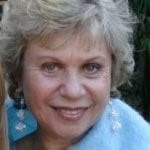A professional educator who takes teachers and students to Poland, immersing them in the Holocaust experience, spoke out publicly against that country’s new law criminalizing claims of Polish complicity during the war.
But Dr. Zipora “Tsipy” Gur, founder and executive director of Classrooms Without Borders, vowed to continue her organization’s work despite the law. She also refuses to censor its programming to accommodate a climate that is increasingly hostile to the idea that Poles played a part in murdering Jews.
“It’s even more important now to double what we do,” Gur said during a recent visit to Louisville. “I really feel like we have a responsibility now.”
An Israeli and the daughter of survivors, Gur made her remarks during a program Sunday, February 11, at Temple Shalom. She was in town to promote her Pittsburgh-based organization to Jewish leaders here.
In addition to Temple Shalom, she met with officials from the Jewish Heritage Fund for Excellence, the High School for Jewish Studies, The Temple and area schools.
Two Louisville instructors who teach the Holocaust, Fred Whittaker and Ron Skillern, will travel with Gur to Poland this summer, both making their first trip to the country.
Gur’s remarks came days after Polish President Andrzej Duda signed into a law an act criminalizing claims of complicity by “the Polish Nation” during World War II. Violators face up to three years in prison.
The law, which scholars believe could chill open discussion of the Holocaust and the roles many Poles played in it, has been criticized by the U.S. and Israeli governments as well as Yad Vashem, the U.S. Holocaust Memorial Museum and other organizations and religious groups.
The law’s passage has generated a current of anti-Semitic rhetoric in the Polish media. One advisor to President Duda chided Israel for having a “feeling of shame at the passivity of the Jews during the Holocaust,” the Associated Press reported.
Gur, though, is not concerned about the safety of the group she will lead to Poland this summer.
“It’s not like there’s a KGB walking with us, listening to everything we’re saying,” she said, adding, “I feel very safe in Poland.”
She wasn’t so clear on how the law might affect Howard Chandler, a Holocaust survivor from Starachowice, Poland, who today lives in Canada. Chandler, 89, accompanies Gur on her trips, retelling his story of survival and offering background at sites the group visits.
At Auschwitz-Birkenau, Chandler stands up in the barracks, speaking for as long as an hour about his experience in the camp. Tourists typically stop, listening intently to what he says.
He may not be able to give that speech this summer – at least, not at Auschwitz.
“I have to learn more about Howard,” Gur said. “It (Auschwitz) might not be the place to tell the story. But we’re not changing the curriculum, because this IS the story.”
Chandler, who is currently in Florida, texted Community, saying he is “not afraid” when he “speaks the truth.”
Founded in 2011, in association with the Jewish Federation of Greater Pittsburgh, Classrooms Without Borders is a nonprofit organization that offers “experiential education” to teachers, students and others who want to learn about the Holocaust through the lenses of tolerance and acceptance.
The organization has brought more than 500 educators from public, private and parochial schools to Poland, Germany, Greece, Israel and Spain.
Gur, a professional educator for more than 30 years, received the Shazar Award for Excellence in Jewish Education in 1993 from the Jewish Education Institute. It was presented by the then-President of Israel, Chaim Herzog.
Gur said she’s committed to inspiring teachers and giving them new tools to teach this period of history.
“Teachers can change a generation,” she said.
Ron Skillern, the 2017 Kentucky Teacher of the Year who teaches Holocaust studies at Western Kentucky University’s VAMPY program, also showed little apprehension about going to Poland this summer.
“You do have a little concern about security, but that’s not at the forefront,” he said. “I’m going [to Poland] to learn, and there has never been a more important time to do this work.”




